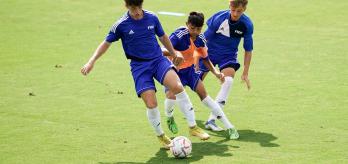Sandy Mosher and the research team from York University analysed a sample of several hundred athletes to determine how the different criteria we use to define the vague concept of "early specialisation" affect the way we classify young athletes, and to find out whether there is any obvious benefit to specialising in a single sport from an early age. The study yielded some surprising results that have significant implications for coaches in football and other sports.
Key take-aways
-
Defining "early specialisation" is extremely complex; there are multiple ways of defining it but each has inherent limitations.
-
The research findings demonstrated that there were very few elite athletes who specialised very early (i.e., before the age of twelve) – potentially indicating that any benefit of specialising that early is limited.
-
Only 50% of the athletes in the sample were specialists by the age of 18, so there were not as many specialists in the sample as one might think.
-
However, there is evidence that footballers may be specialising earlier than athletes in other sports; coaches should be aware that trends could be highly sports-specific.
-
Coaches need to take this into account by focusing on enjoyment and making sure their players are physically equipped to cope with specialised training regimes at a relatively early age.
Watch brief
Read summary
Part 1: Background
Researchers have been wrestling with the concept of specialisation in sport and how it affects young athletes, including footballers, for some time. Nevertheless, there is still a lot of ambiguity in this field. For example, a systematic literature review carried out as part of this study identified four separate definitions of specialisation. Similarly, there is no clear threshold as to the age below which specialisation is concerned to be early, and no fewer than 18 different methods have been used in previous studies to determine whether an athlete should be considered “specialised” or not.
Part 2: Findings
The first part of the study examined how different ways of measuring specialisation affect the way athletes are classified during their development. Part 1 surveyed 362 athletes from a variety of sports to establish when they had become "specialised" according to three different benchmarks. The results showed that, on average, first participation in the athletes’ main sports was around nine, year-round training began from around the age of 14, and the athletes began excluding other sports at around 15 years of age. The second part of the study then considered 237 athletes over 18 to see when they had specialised in their chosen sports, and what level (elite, pre-elite, non-elite) they had eventually achieved in their sport. Here the research suggested that elite and pre-elite athletes started meeting the criteria to be considered specialists from around 12 or 13 years of age.
Part 3: Implications
Across the sample as a whole, there appeared to be fewer specialised athletes than expected. There were very few early specialisers, and the study did not find any obvious advantage or disadvantage to early specialisation. However, the picture may be slightly different when it comes to football. The footballers in the study tended to specialise slightly earlier than average, and more than 90% of the elite footballers were specialised by the age of 18. This is one reason why there is a need to raise awareness of early specialisation among coaches. If we accept that footballers are specialising earlier than other athletes, coaches need to take that into account by ensuring young players are physically prepared for the demands of specialist training regimes and encouraging enjoyment, which is a key factor in maintaining engagement.
Paper citation and link
Mosher, A., Fraser-Thomas, J., Wilson, M. J., Baker, J, 2022, “Proportions of Early Specializers Varies According to Methods and Skill Level”, Sports, vol. 10, no. 3, pp. 34.
Read the full paper here.











